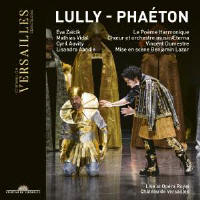Texte paru dans: / Appeared in: Château de Versailles Spectacles |
|
|
Outil de traduction (Très approximatif) |
|
|
Reviewer: Richard Lawrence Phaéton was the last of Philippe Quinault’s librettos for Lully to be based on Ovid’s Metamorphoses. After its premiere at Versailles on January 6, 1683, it opened at the Opéra in April. Known as ‘the people’s opera’, it was revived many times, right up to 1742. It has been well served on CD: here is another version, complementing the DVD of a staging from the 18th-century Opéra Royal at Versailles. The performance is a joint venture between Le Poème Harmonique and MusicAeterna, the early music ensemble based in Siberia. The tale is one of hubris. Phaéton rejects Théone, not out of love but because he sees marriage with Lybie, daughter of king Mérops, as his path to the throne. This provokes the wrath of Epaphus, who taunts Phaéton by casting doubt on his parentage. The Sun confirms that he is Phaéton’s father, but the young man demands more: he drives the Sun’s chariot across the heavens and, losing control, is struck down by Jupiter. And yet his fate is both inevitable and desired: it’s predicted by the sea god Protée, and Phaéton himself says that he would prefer a brilliant death to an obscure life. In the Prologue, Saturn invites the goddess Astrée to return to the Earth, from which she was expelled long ago, as a new golden age has emerged under ‘the greatest of heroes’. This is, of course, the usual extolling of the unnamed Louis XIV. The director, Benjamin Lazar, provides a connection with the opera proper by making the ensuing story a flashback. Astrée is seated at a table with a globe and a revolver: puzzling, but all is made clear at the end of the opera. The scenery and costumes are a mixture of old and new, with some lavishly neoBaroque headgear. The video projections are variably successful. In the Prologue, children at play conjure up idyllic scenes of childhood, and the final conflagration is imaginatively done. But the Chaconne in Act 2 is not enhanced by images of soldiers marching and goose-stepping, followed by a parachute drop; likewise the Bourrée in Act 5, which is accompanied by – among other things – shots of the Queen and the Duke of Edinburgh hailed by enthusiastic crowds. Benjamin Lazar has worked with Vincent Dumestre before. As in the Molière/Lully Le bourgeois gentilhomme (Alpha, 5/06) – I haven’t seen Cadmus et Hermione (Alpha, 2/09), but I imagine the same is true – the singers employ 17th-century pronunciation: so that, for instance, the last letters of ‘vous’ and ‘voulez’ are sounded, and ‘foi’ comes out as ‘fwé’. And there is much stylised gesturing, sometimes synchronised. The ambitious, headstrong Phaéton is not a sympathetic character. Mathias Vidal is good at showing his resentment and his sense of entitlement; a more appealing side is shown when he reflects on his cruel treatment of Théone – and how tenderly he is accompanied by the strings! When Phaéton tells the Sun that he is not frightened by death, Vidal’s hushed tones are even more effective than Emiliano Gonzalez Toro’s vigorous proclaiming on Christophe Rousset’s CD recording. The other haute-contre is Cyril Auvity: he is in slightly better voice on the Rousset, where he takes the same three roles. Éva Zaïcik and Victoire Bunel are excellent as Lybie and Théone, neither of whom is getting the man she wants. Their Act 1 duet on the difficulties of love is nicely observed. Léa Trommenschlager is a formidable Climène, first encouraging her son, then anxious when Protée – a seedy portrayal by Viktor Shapovalov – foretells his death. The most moving moment in the opera comes in the scene towards the end where Lybie and Epaphus – powerfully performed by Lisandro Abadie – face permanent separation. The Russian chorus and the Franco-Russian orchestra perform well for Vincent Dumestre, though to my ears the playing of the recorders in the ‘sleep’ scene is slightly sharp. There are one or two cuts, as there are on the Marc Minkowski recording. For a CD-only version, you couldn’t go wrong with either Minkowski or, even better, Rousset. If you want a DVD this staging, despite its oddities, will not disappoint. And, oh yes, the revolver: rather than a thunderbolt from Jupiter, it’s a pistol shot from Astrée that dispatches the hapless Phaéton. |
|




